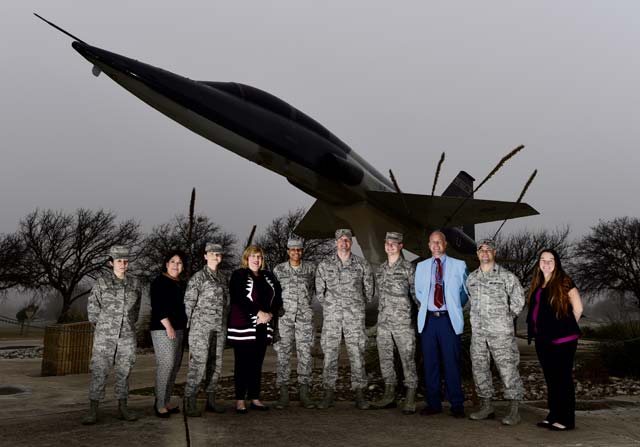
LAUGHLIN AIR FORCE BASE, Texas — The mental health flight might be a unit hidden in the far corner of Laughlin’s medical group, however, this small unit of Airmen work tirelessly to ensure pilots remain in flight status, the first responders remain able to safeguard the base, and even work with active duty members’ families and civilian employees to rest assured the mission goes on.
Mental health is one of the four pillars of comprehensive airman fitness, along with physical, social and spiritual fitness, and a critical component to a person’s well-being.
“Laughlin is a tight-knit community,” said Maj. Owen-John Williams, 47th Medical Group Mental Health Clinic commander. “We celebrate each other’s victories and successes, and we hurt deeply when members of the community feel pain or suffer a devastating setback in life. ‘Healthy’ mental health also means we recognize when our wingmen are hurting, and we are there to offer support and encouragement to them, or guide them to professional helping services if necessary”
Williams appreciates the path his career takes him, within and without the traditional lanes of providing psychotherapy services.
“Every day I come to work, I get the opportunity to impact someone’s life in a positive way, be it a patient I’m treating, a commander I’m advising or professionally mentoring and developing one of my Airmen,” Williams said.
Airman Monet Gaston-Crevelle, 47th MDG mental health clinic technician, appreciates the technicians have an opportunity to form a relationship with the patients even though they are not psychologists.
“There have been times where a patient came in frantic, and we were able to calm them and provide the information they needed,” Gaston said. “We funneled the issue through the chain of command and helped them resolve their issue. It’s nice to be able to help them progress and reach their personal goals.”
The mental health flight also provides opportunities for the technicians to broaden their horizons, Gaston added.
“The mental health technicians are now able to sit in more often with in-takes,” said Airman 1st Class Christopher Dunning, 47th MDG Mental Health Clinic technician. “Even though we do more administrative work, I love the opportunity to help people. I didn’t even realize it was a job, but it’s what all of us love doing — helping others.”
However, mental health is not without challenges as they constantly work to balance taking care of the active duty members, ensuring they are ever deployment-ready and also caring for their families as well. These are the two primary mission goals for mental health which non-military facilities do not contend with.
“In addition to our primary mission of accepting patients, active duty and their dependents, we also train monthly on deployment readiness skills so we can effectively deliver the mental health mission downrange,” said Williams.
Dr. Scott Storm, 47th MDG Mental Health Clinic contract clinical psychologist, also noted another challenge for the mental health clinic is the fact those in need of assistance do not always feel comfortable going to mental health. He reassured just visiting mental health is not detrimental to one’s military career.
“Military members sometimes think that if they come in and see us they’re automatically looking at administrative separation,” Storm said. “That’s not true at all. The Air Force has become very aware that Airmen have issues whether they be pilots, security forces, etc. Our goal, in fact, is to keep people in the military.”
According to Williams, the mental health team at Laughlin, which also includes the alcohol and drug abuse prevention and treatment program and the family advocacy program, is absolutely committed to enhancing the mental health of the base.
“From our performance enhancement and stress management sessions with the student pilots to educating our Airmen about responsible drinking behaviors to hosting fitness playgroups for our parents and [toddlers] and helping families navigate the joys and challenges of parenting, we strive to bring our knowledge and expertise to the base population,” Williams said.
“Healthy” mental health, Williams stated, means taking care of, nourishing and enhancing emotional and psychological needs, and not just seeking help when things aren’t going smoothly or life “throws a wicked curve ball.”
One might use the analogy of a physical injury. If a person’s leg was bleeding profusely, the person would seek medical attention. Those with stressors in life who are finding it difficult to cope may feel as if they’re suffering a preverbal injury of the mind. It is not a tangible, visible injury, however, wellness of the mind is equally as important as wellness of the body.
Laughlin mental health clinic accomplishes these goals every day, assisting anyone on the base in need of support.


